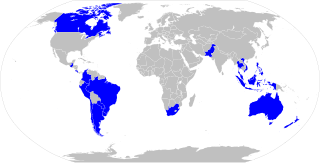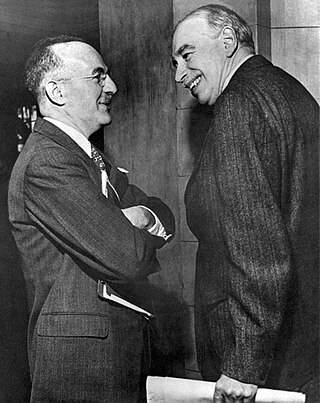Related Research Articles
The General Agreement on Tariffs and Trade (GATT) is a legal agreement between many countries, whose overall purpose was to promote international trade by reducing or eliminating trade barriers such as tariffs or quotas. According to its preamble, its purpose was the "substantial reduction of tariffs and other trade barriers and the elimination of preferences, on a reciprocal and mutually advantageous basis."

The World Trade Organization (WTO) is an intergovernmental organization headquartered in Geneva, Switzerland that regulates and facilitates international trade. Governments use the organization to establish, revise, and enforce the rules that govern international trade in cooperation with the United Nations System. The WTO is the world's largest international economic organization, with 164 member states representing over 98% of global trade and global GDP.

The least developed countries (LDCs) are developing countries listed by the United Nations that exhibit the lowest indicators of socioeconomic development. The concept of LDCs originated in the late 1960s and the first group of LDCs was listed by the UN in its resolution 2768 (XXVI) on 18 November 1971.

The Cairns Group is an interest group of 19 agricultural exporting countries, composed of Argentina, Australia, Brazil, Canada, Chile, Colombia, Costa Rica, Guatemala, Indonesia, Malaysia, New Zealand, Pakistan, Paraguay, Peru, the Philippines, South Africa, Thailand, Ukraine, Uruguay, and Vietnam.
The Doha Development Round or Doha Development Agenda (DDA) is the trade-negotiation round of the World Trade Organization (WTO) which commenced in November 2001 under then director-general Mike Moore. Its objective was to lower trade barriers around the world, and thus increase global trade.
Export subsidy is a government policy to encourage export of goods and discourage sale of goods on the domestic market through direct payments, low-cost loans, tax relief for exporters, or government-financed international advertising. An export subsidy reduces the price paid by foreign importers, which means domestic consumers pay more than foreign consumers. The World Trade Organization (WTO) prohibits most subsidies directly linked to the volume of exports, except for LDCs. Incentives are given by the government of a country to exporters to encourage export of goods.

In international trade, market access refers to a company's ability to enter a foreign market by selling its goods and services in another country. Market access is not the same as free trade, because market access is normally subject to conditions or requirements, whereas under ideal free trade conditions goods and services can circulate across borders without any barriers to trade. Expanding market access is therefore often a more achievable goal of trade negotiations than achieving free trade.
The Fourth Ministerial Conference of the World Trade Organization, also known as the WTO Fourth Ministerial Conference or MC4, was held at the Sheraton Doha Hotel and Resort, Doha, Qatar from November 9–13, 2001. At this conference, ministers from all WTO members launched the Doha Development Agenda.
The Agreement on Agriculture (AoA) is an international treaty of the World Trade Organization. It was negotiated during the Uruguay Round of the General Agreement on Tariffs and Trade, and entered into force with the establishment of the WTO on 1 January 1995.

The WTO Ministerial Conference of 1999 was the third Ministerial-level meeting of the World Trade Organization, convened at the Washington State Convention and Trade Center in Seattle, Washington, USA, over the course of four days, from Tuesday, 30 November 1999 to Friday, 3 December 1999. Anti-globalization activists organized large-scale protests of the meeting, sometimes known as the Battle of Seattle. Direct action tactics forced the WTO Ministerial Conference to begin late on 30 November and contributed to the meeting ending without agreement on 3 December.
Trade facilitation looks at how procedures and controls governing the movement of goods across national borders can be improved to reduce associated cost burdens and maximise efficiency while safeguarding legitimate regulatory objectives. Business costs may be a direct function of collecting information and submitting declarations or an indirect consequence of border checks in the form of delays and associated time penalties, forgone business opportunities and reduced competitiveness.

A Certificate of Origin or Declaration of Origin is a document widely used in international trade transactions which attests that the product listed therein has met certain criteria to be considered as originating in a particular country. A certificate of origin / declaration of origin is generally prepared and completed by the exporter or the manufacturer, and may be subject to official certification by an authorized third party. It is often submitted to a customs authority of the importing country to justify the product's eligibility for entry and/or its entitlement to preferential treatment. Guidelines for issuance of Certificates of Origin by chambers of commerce globally are issued by the International Chamber of Commerce.
This is a timeline of the World Trade Organization (WTO).

Rules of origin are the rules to attribute a country of origin to a product in order to determine its "economic nationality". The need to establish rules of origin stems from the fact that the implementation of trade policy measures, such as tariffs, quotas, trade remedies, in various cases, depends on the country of origin of the product at hand.
At the World Trade Organization Ministerial Conference of 2003, trade ministers from 146 members of the World Trade Organization (WTO), representing 93 percent of global commerce, convened in Cancún, Mexico, in September 2003. The conference was held at the Cancún Centro de Convenciones, Cancún. The goal of this meeting was to set a direction for nations within the WTO to negotiate agreements on agriculture, non-agricultural market access, services, and special treatment for developing countries. The negotiations were supposed to be completed by January 1, 2005. Although the agreements had a set date to come to terms, the Cancun Ministerial Conference ended up failing in its mission and did not come to any firm decisions to fix the problems it sought to address. Participants failed to make global trade negotiations concrete and foundered at that time, so the next steps were uncertain. However, attempts were made afterwards to learn from this failure. Within the committee, there exists a hierarchy within the World Trade Organization. It is made up of trade Administrators that come from all the different sectors of the WTO.
The Ministerial Conference is the top decision making body of the World Trade Organization (WTO). There have been twelve ministerial conferences from 1996 to 2022, usually every two years.

The Global System of Trade Preferences among Developing Countries(G.S.T.P) is a preferential trade agreement, currently encompassing 42 members (“participants”), signed on 13 April 1988 with the aim of increasing trade between developing countries. It was negotiated within the framework of the United Nations Conference on Trade and Development (UNCTAD). The Agreement entered into force on 19 April 1989 and was notified to the then General Agreement on Tariffs and Trade (GATT), predecessor of the World Trade Organization (WTO), on 25 September 1989. The 42 members of GSTP include 7 LDCs as well.

The World Trade Organization (WTO) is an intergovernmental organization which regulates international trade. The WTO officially commenced on 1 January 1995 under the Marrakesh Agreement, signed by 123 nations on 15 April 1994, replacing the General Agreement on Tariffs and Trade (GATT), which commenced in 1948. The WTO deals with regulation of trade between participating countries by providing a framework for negotiating trade agreements and a dispute resolution process aimed at enforcing participants' adherence to WTO agreements, which is signed by representatives of member governments and ratified by their parliaments. Most of the issues that the WTO focuses on derive from previous trade negotiations, especially from the Uruguay Round (1986–1994).
The Trade Facilitation Agreement (TFA), was confirmed in Bali, Indonesia in December 2013 at the Ninth Ministerial Conference. After almost 20 years of negotiations the agreement was officially an open invitation for acceptance from the 160 members of the World Trade Organisation (WTO) on 27 December 2014. However the agreement will only be ratified once 2/3 of the members have informed the WTO of their agreement. For the WTO, the agreement can be viewed as a historic achievement as it is the first multilateral agreement since the WTO's inception in 1995. The Trade Facilitation Agreement of 2014 is a global multilateral initiative to rationalise the stringent procedures which govern international trade. The principal focus of the Agreement is to have numerous positive consequences on developed and Least Developed Countries. Estimates have shown that the Trade Facilitation Agreement would reduce trade costs by an average of 14.5%. In turn, this would prospectively improve trade globally by on trillion dollars. This reduction of bureaucratic 'red tape' will have favourable effects on small to medium Businesses, making it easier for them to trade and join global value chains. One of the most significant aspects of this agreement, lies in the new principle that developing and Least Developed Countries commitments to the implementation of the provisions outlined by the agreement are conditioned on their procurement of necessary technical capacity.
Duty Free Tariff Preference (DFTP) is a unilateral non-reciprocal preferential tariff scheme provided by the Government of India for the least developed countries (LDCs). The scheme was officially introduced on 13 August 2008. India was the first developing country to introduce a preferential tariff program for the LDCs.
References
- 1 2 "Asymmetries mark WTO's Bali Accord". Archived from the original on 17 December 2013.
{{cite news}}: CS1 maint: unfit URL (link) - 1 2 Donnan, Shawn (7 December 2013). "WTO approves landmark global trade deal". Financial Times. Retrieved 7 December 2013.
- 1 2 "Days 3, 4 and 5: Round-the-clock consultations produce 'Bali Package'". World Trade Organization . 7 December 2013. Retrieved 7 December 2013.
- ↑ Ignatzi, Christian; Wutke, Eva (7 December 2013). "WTO Bali agreement expected to boost growth". Deutsche Welle. Retrieved 8 December 2013.
- 1 2 "Draft Bali Ministerial Declaration". World Trade Organization. 7 December 2013. Archived from the original on 18 December 2013. Retrieved 8 December 2013.
- ↑ WTO, WTO’s Trade Facilitation Agreement enters into force, 22 February 2017
- 1 2 3 "WTO's 'Bali Package' to benefit PH, says Domingo". Inquirer. 8 December 2013.
- 1 2 "WTO Bali Declaration: what does it mean?". ODI UK. Archived from the original on 24 December 2013. Retrieved 22 December 2013.
- ↑ WTO, About the Facility, accessed 25 January 2017
- ↑ "Right to food wins 'defensive battle' in World Trade Organization deal". Global Post.
- ↑ "WTO: 2011 NEWS ITEMS". wto.org. Retrieved 22 December 2013.
- 1 2 3 "WTO deal aims to boost global commerce". Al Jazeera. 7 December 2013. Retrieved 7 December 2013.
- ↑ Hufbauer, Gary Clyde; Schott, Jeffrey J.; Cimino, Cathleen; Muir, Julia (18 April 2013). "Payoff from the World Trade Agenda 2013". ICC Research Foundation. Retrieved 7 December 2013.
{{cite journal}}: Cite journal requires|journal=(help) - ↑ "World Trade Organisation adopts Bali Accord, to move ahead on Doha round". The Indian Express. 7 December 2013. Retrieved 7 December 2013.
- ↑ Schneider, Howard (7 December 2013). "U.S.-India compromise allows trade deal to hobble forward at WTO". The Washington Post. Retrieved 7 December 2013.
- ↑ "W.T.O. Reaches First Global Trade Deal". The New York Times. 7 December 2013. Retrieved 7 December 2013.
- ↑ "India and US reach WTO breakthrough over food". BBC. 13 November 2014. Retrieved 13 November 2014.
- ↑ Zarocostas, John (7 December 2013). "Global Trade Deal Reached". WWD. Retrieved 8 December 2013.
- ↑ Christophe Bellmann (2014). "The Bali Agreement: Implications for Development and the WTO". Revue Internationale de Politique de Développement. 5 (2). doi: 10.4000/poldev.1744 . Retrieved 14 November 2017.
- ↑ Shubhajit Roy (17 November 2015). "All elements of Bali package must be fully implemented: PM Modi". The Indian Express. Retrieved 14 November 2017.
- ↑ Vaidyanathan Iyer (15 November 2014). "Modi-Obama meeting sealed trade deal, WTO says Bali package could be in force in 2 weeks". The Indian Express. Retrieved 14 November 2017.
- ↑ "Trade facilitation in the Bali Package: What's in it for Africa?". Afdb.org. 16 December 2013. Retrieved 14 November 2017.